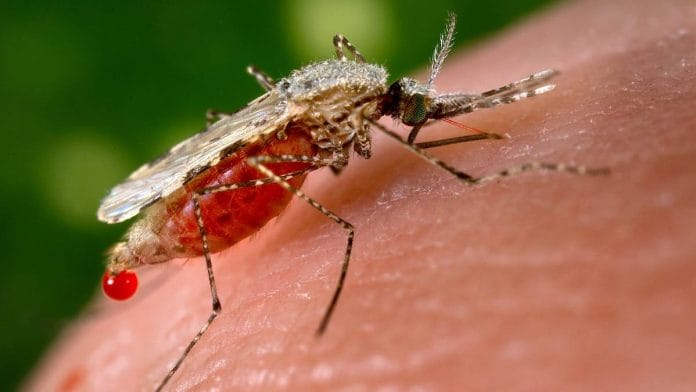New Delhi: A comprehensive genome sequencing of a Anopheles stephensi — a malaria-carrying mosquito found in India and Asia — has revealed at least 29 previously unknown genes that make them resistant to insecticides.
Anopheles stephensi is the primary vector of urban malaria in the Indian subcontinent and the Middle East and an emerging malaria vector in Africa. Mosquito-transmitted malaria claimed more than 4 lakh human lives in 2019.
Researchers from University of California, Irvine, Institute of Bioinformatics and Applied Biotechnology in Bengaluru and the Tata Institute for Genetics and Society (TIGS) at UC San Diego and Bengaluru collaborated to produce a new reference genome for a sample of the mosquito from India.
Every living organism is run by a set of genomes that ‘instruct’ cells how to build proteins. Understanding the sequence of genes is thus like cracking the code to the organism and how it functions. Unravelling the genetic code, letter-by-letter, is known as genetic sequencing.
Parts of the Anopheles stephensi genome were already known to scientists, but in this new effort, researchers unearthed over 3,000 genes that previously evaded scrutiny.
These include 29 genes that help these mosquitoes develop resistance to chemical insecticides. The study, published in the journal BMC Biology, also shows how this insecticide resistance evolves differently between sexes.
Also read: How malaria remains dormant in human body and reappears months later
Why is it significant
Suresh Subramani, global director at TIGS and one of the authors of the study, told ThePrint that the genome sequence allows scientists to study the mosquito “as a model organism to ask when and how the female mosquito transitions from feeding on nectar as a juvenile, to wanting to bite humans when she starts maturing to lay eggs”.
“By knowing the genetic blueprint of the organism you are working on, one can study the evolution of that organism, its migration patterns, its population ecology, its capacity to transmit the malarial parasite, how it evades the insecticides we use to kill it by developing mutations in insecticide resistance genes, how its adjusts to new habitats, etc,” he said.
“There are also tools developed by our scientists, wherein you can use gene editing to reverse these mutations, which we hope will make the mosquito sensitive once again to that class of insecticide,” he added.
Using this knowledge, researchers can use gene editing technologies like CRISPR to edit and eliminate the genomes in mosquitoes that make them resilient to mosquito repellants.
This circumvents the current problem where new classes of insecticides have to be developed and tested every few years as the mosquito evolves resistance.
“About 12 per cent of the malaria in India is caused by Anopheles stephensi, which is the major vector for urban malaria and India has a national goal of eliminating malaria by 2030. Its potential to transmit malaria is the main reason we sequenced Anopheles stephensi,” Subramani added.
“Notably, Anopheles stephensi has recently been found to invade the horn of Africa, where Anopheles gambia — another malaria carrying mosquito species — is the major vector, and could become a serious problem there,” he said.
Also read: New microbe offers big malaria hope — it saves humans and doesn’t kill mosquitoes either






